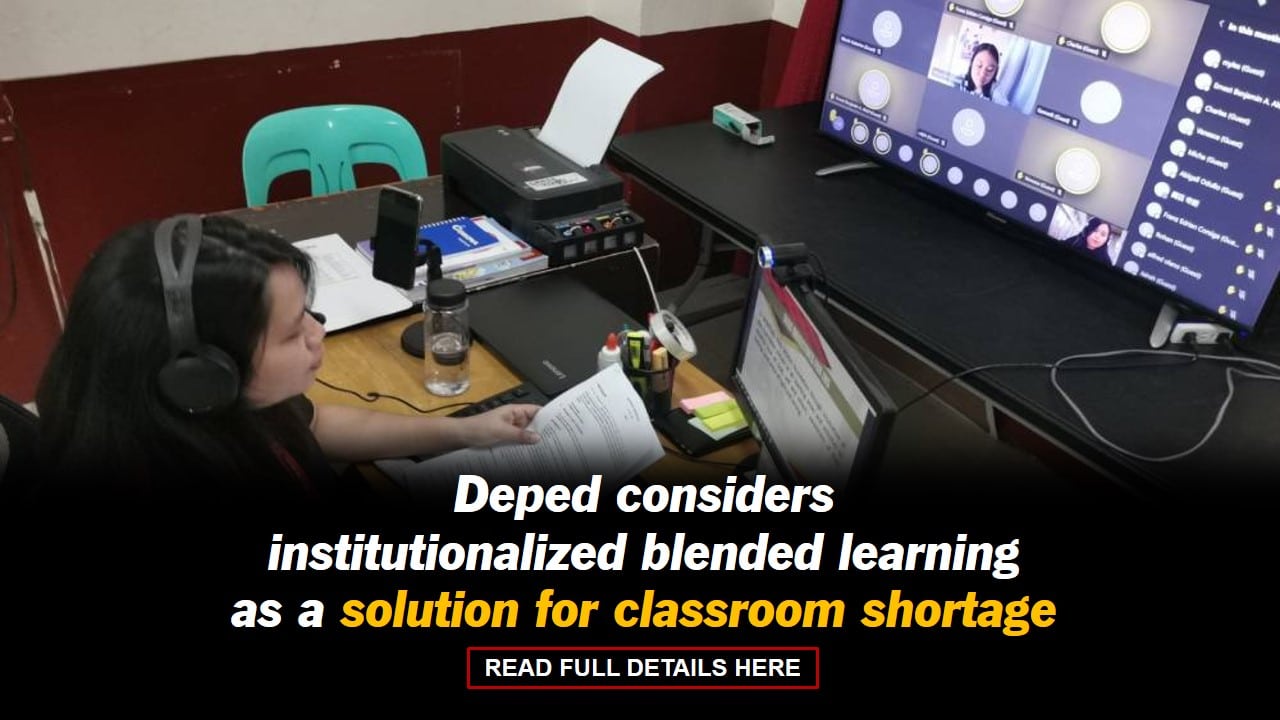
The Department of Education (DepEd) said on Friday that it is researching institutionalizing blended learning and developing a disaster-resistant school design.
According to DepEd spokesperson Michael Poa during a news conference, institutionalizing a blended learning environment in basic education can assist handle the effects of an expanding student population and the effects of natural disasters.
“Bakit pinag-aaralan na po ‘yung pag-institutionalize ng blended learning as a mode in our schools? Dahil po ang pananaw diyan ng Department of Education ay ito ay isa sa solusyon para diyan sa classroom shortage (Why are we studying to institutionalize the blended learning mode in our schools? Because in the DepEd’s point of view, it can solve classroom shortage). This is something that we are reviewing right now. And we are looking if it is possible to institutionalize blended learning sa ating basic education schools,” he stated.
In-person, online, and other modular or alternative learning formats are all included in blended learning setups.
Additionally, Poa said, “Talagang mahirap nang resolbahin ‘yung pagdating sa classroom shortage, kasi bukod sa ating backlogs, perennial problem na po ‘yung ating classroom shortage, dahil taun-taon, dumadami rin ‘yung ating enrollees, at taun-taon may kalamidad na dumadaan sa ating bansa (It’s really hard to resolve classroom shortage, besides the backlogs, it’s a perennial problem, because yearly, we have a rising number of enrollees, and yearly there are calamities, hitting the country).”
Around 165 schools were damaged by Super Typhoon Karding alone, bringing the total estimated cost of repairing schools to PHP 1.169 billion.
Poa stated that the DepEd is also working towards improving school designs that may be resilient to severe disasters.
“Pinag-aaralan na po ‘yung tinatawag nating (we are studying what we call) disaster-resilient schools, so in collaboration with the private sector and other organizations. Pinag-aaralan na po nila kung paano mai-improve ‘yung school designs natin, para maging (They are reviewing how to improve school designs so it can be) disaster-resilient po siya,” he added.
Currently, during a disaster, schools in typhoon-affected areas immediately switch to other learning modalities.
“Right now, we are already starting to download or we are looking to download funds to our regions to start the requirements and build temporary learning spaces or other interventions but this is a developing situation,” Poa stated.
Curriculum review
When the DepEd has finished examining the curriculum for grades K through 10, Poa said, they will continue talks with stakeholders through October, and by November they will begin reviewing the curriculum for grades 11 through 12.
According to him, “We want to focus on literacy, specifically on foundational literacy and functional literacy. For now, it’s still being vetted, we can’t give a comprehensive report yet on the results of the review.”
He added that he hoped to finish the K–12 program review by June 2023.
Additionally, the DepEd promised to make changes to the program that would solve job mismatch.
“Ang promise po ng K-12 (Our promise in K-12) is that when our learners graduate after Grade 12, they are employable pero hindi po nangyayari yan sa ngayon. So ang direksyon po natin is to try to align yung mga (but it’s not happening now. So the direction is to align) skills , especially tech voc track, yung mga skills na nakukuha nila sa Grade 12 to the industry demand,” Poa said.
